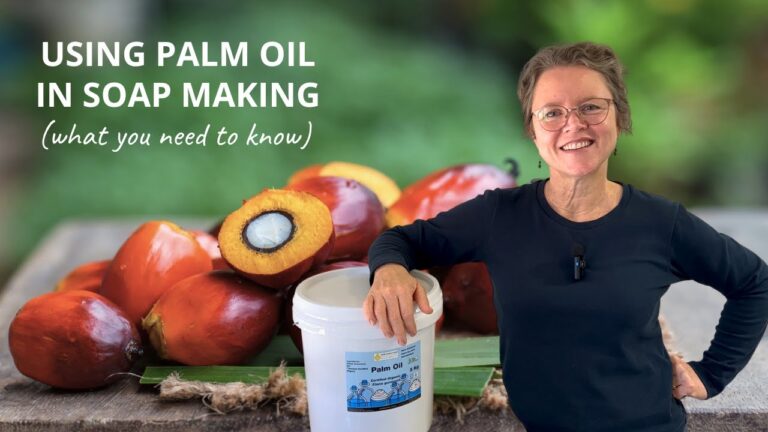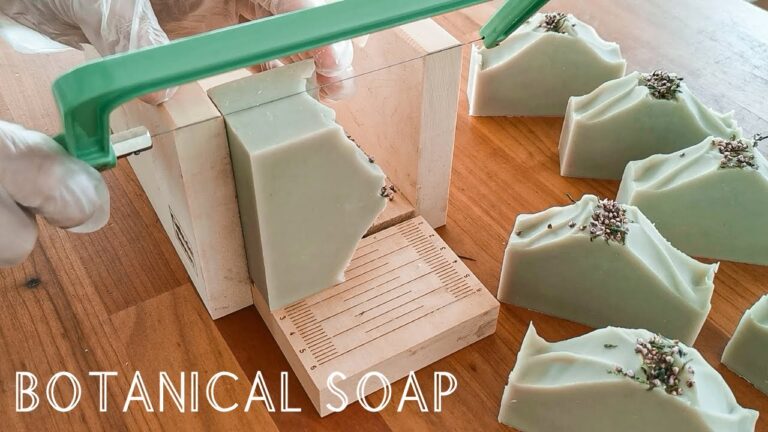Discover how sustainable palm oil is transforming the soap making industry. From its environmental benefits to its ethical sourcing practices, sustainable palm oil is revolutionizing the way we create our favorite soap products. Learn more about this eco-friendly ingredient and how it’s making a positive impact on both the planet and local communities. Join the movement towards a more sustainable future with every lather.
Is palm oil effective for soap making?
Palm oil is a popular choice for soap making due to its exceptional lathering and hardening qualities, making it a key ingredient for many soap makers. Despite its effectiveness, concerns have been raised about the sustainability of palm oil production in recent years, leading to a tarnished reputation. As a result, some soap makers are opting for more sustainable alternatives to ensure their products are environmentally friendly.
Can sustainable palm oil production be achieved?
Palm oil, when produced sustainably, has the potential to be a more economically viable and environmentally friendly option compared to other vegetable oils. It requires up to 10 times less land per tonne of oil produced than alternatives like rapeseed or sunflower, making it a more efficient use of resources. By implementing sustainable practices, palm oil production can help minimize deforestation and protect biodiversity, ensuring a more sustainable future for our planet.
What alternative oil can be used in place of palm oil for soap making?
Looking for a palm oil alternative for soap making? Consider using tallow or lard, which provide similar hardening properties in cold process soap. Another option is to increase the coconut oil content up to 33%, though this can be drying, so be sure to adjust the superfat or add moisturizing oils like avocado and sweet almond to balance it out.
In search of a sustainable option to replace palm oil in your soap recipe? Tallow and lard are great alternatives that offer similar hardening properties in cold process soap. Additionally, you can increase the coconut oil content up to 33%, but be mindful of potential drying effects and consider adjusting the superfat or adding moisturizing oils like avocado and sweet almond for a balanced formula.
Sustainable Sourcing: The Impact of Palm Oil in Soap Production
As the demand for sustainable sourcing continues to grow, the impact of palm oil in soap production has come under scrutiny. Palm oil is a commonly used ingredient in soap production due to its versatility and cost-effectiveness. However, the widespread cultivation of palm oil has led to deforestation, habitat destruction, and negative impacts on indigenous communities. As consumers become more conscious of the environmental and social implications of their purchasing decisions, the soap industry is facing pressure to seek more sustainable alternatives to palm oil.
In response to the growing concern over the impact of palm oil, the soap industry is actively seeking sustainable sourcing solutions. Many companies are turning to certified sustainable palm oil, which is produced in a more environmentally and socially responsible manner. Additionally, there is a growing trend towards using alternative ingredients such as coconut oil, shea butter, and olive oil in soap production. These sustainable sourcing efforts not only address the environmental and social issues associated with palm oil, but also cater to the increasing consumer demand for ethically produced and environmentally friendly products.
Ultimately, the impact of palm oil in soap production underscores the need for the industry to prioritize sustainable sourcing practices. By embracing certified sustainable palm oil and exploring alternative ingredients, soap manufacturers can reduce their environmental footprint and contribute to the preservation of vital ecosystems. As consumers continue to advocate for sustainable products, the soap industry has an opportunity to lead the way in ethical and environmentally responsible sourcing.
Eco-Friendly Ingredients: Utilizing Palm Oil for Sustainable Soap Making
Are you looking to make a positive impact on the environment with your soap making? Look no further than utilizing eco-friendly ingredients like palm oil. Not only is palm oil sustainable, but it also helps to support local communities and preserve natural habitats. By choosing palm oil for your soap making, you can create products that are not only good for your skin, but good for the planet as well.
When it comes to sustainable soap making, palm oil is a versatile ingredient that offers numerous benefits. It is rich in antioxidants and vitamins, making it a great choice for nourishing and moisturizing the skin. Additionally, palm oil has a high melting point, which helps to create a long-lasting bar of soap that won’t melt away quickly. By incorporating palm oil into your soap making process, you can create products that are not only environmentally-friendly, but also luxurious and effective.
Join the movement towards eco-friendly soap making by incorporating palm oil into your recipes. By choosing sustainable ingredients like palm oil, you can create products that are not only good for your skin, but also for the planet. Make a positive impact on the environment while still enjoying the benefits of high-quality, nourishing soap.
Balancing Sustainability and Production: The Palm Oil Dilemma in Soap Manufacturing
Finding the delicate balance between sustainability and production in the soap manufacturing industry is a pressing issue, particularly when it comes to the use of palm oil. While palm oil is a highly efficient and versatile ingredient, its production often leads to deforestation and habitat destruction. As consumers become increasingly concerned about the environmental impact of their purchases, soap manufacturers must navigate the palm oil dilemma by seeking out sustainable sources and exploring alternative ingredients. By prioritizing sustainability without compromising production, the soap industry can contribute to the preservation of our planet’s natural resources while continuing to meet consumer demand for high-quality products.
By incorporating sustainable palm oil into soap making practices, producers can not only help protect the environment and wildlife, but also support local communities and ensure the long-term viability of their industry. Making this shift towards sustainability not only benefits the planet, but also contributes to a more ethical and responsible supply chain. As consumers become more conscious of the impact of their purchases, choosing products made with sustainable palm oil can help drive positive change in the industry. Ultimately, by choosing to use sustainable palm oil in soap making, we can all play a part in creating a more sustainable and ethical future.



